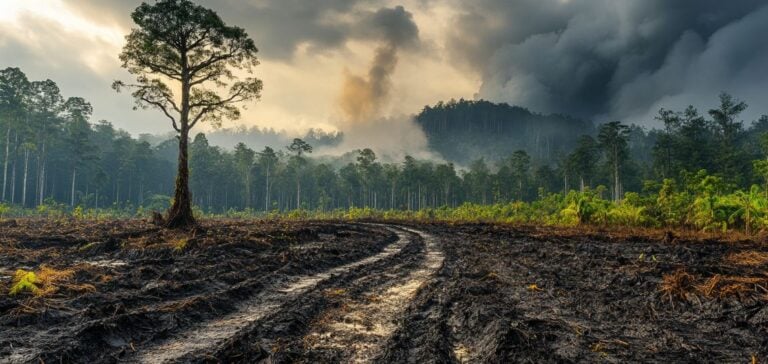The Indonesian government has recently unveiled an ambitious project to transform 20 million hectares of forests into reserves for food, energy, and water. The plan, championed by Minister of Forestry Raja Juli Antoni, aims to achieve self-sufficiency in food and energy, particularly through increased biofuel production. However, environmental organizations have criticized the initiative, calling it “illogical and destructive.”
According to official statements, Indonesia has identified 1.1 million hectares capable of producing 3.5 million tons of rice annually, equivalent to the country’s total rice imports in 2023. Additionally, the government plans to use these lands to cultivate sugar palms for bioethanol production, a renewable alternative to fossil fuels. President Prabowo Subianto has emphasized that this initiative would strengthen the archipelago’s energy self-sufficiency while reducing its reliance on imported fuels.
A Controversial Project
Nevertheless, the plan has been strongly criticized by the Clean Transition Coalition, an alliance of several environmental NGOs. In a statement, the coalition highlighted the risks of massive biodiversity loss and deforestation. It argued that the conversion of forested areas would significantly undermine Indonesia’s food and energy security goals. “The project could lead to an expansion of palm oil production, increasing pressure on already exploited lands,” said Achmad Surambo, executive director of Sawit Watch.
Research conducted by the NGO Satya Bumi reveals that palm oil plantations already cover 17.77 million hectares across Indonesia. Further expansion of these plantations could have devastating effects on ecosystems and local communities, experts warn.
Government Under Pressure
In response to the criticism, the Minister of Forestry sought to reassure stakeholders. He stated that the project would not lead to the destruction of virgin forests but would instead utilize an agroforestry system to maximize the function of already leased lands. According to him, the initiative would prioritize existing concessions rather than targeting pristine areas.
Despite these assurances, NGOs remain skeptical. They argue that even converting agricultural lands for energy crops destined for export could harm ecosystems. They recommend that the government focus on optimizing existing agricultural lands, respecting indigenous rights, and implementing a genuinely sustainable land reform policy.
An Ecological and Economic Dilemma
The project raises critical questions about the balance between economic development and environmental protection in a country where forests play a vital role in global biodiversity. With an area almost twice the size of Java Island involved, the initiative highlights the tension between national needs and global sustainability responsibilities.






















